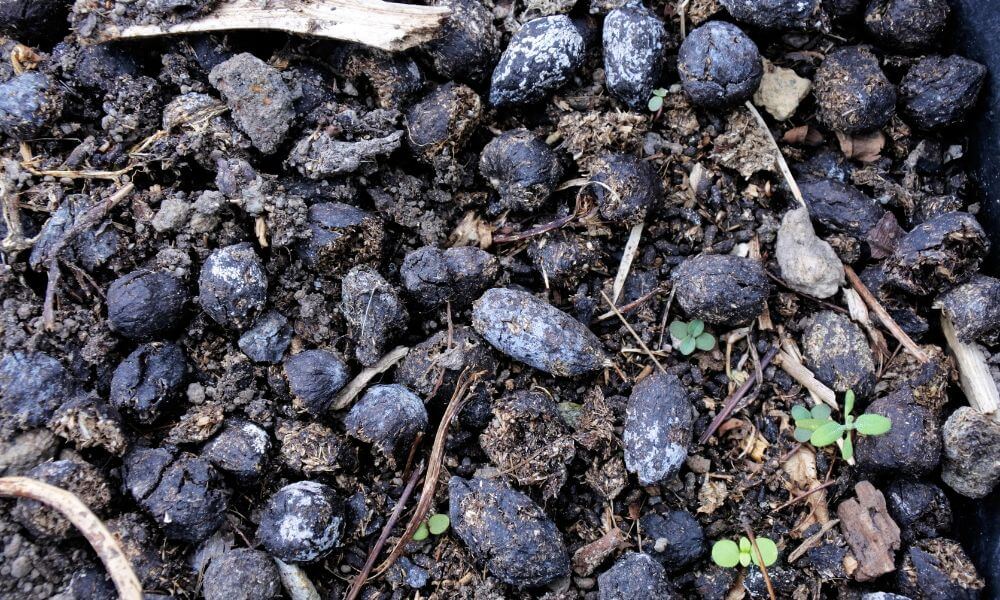There is a huge range of potential fertilizers you can use in your garden.
Whether you want a nice flowerbed or you’re looking to enhance produce to sell on, fertilizer is always a good addition to any green-fingered project.
If you’re also a goat keeper, I’m sure you’ve wondered whether goat manure is a good fit for your garden.
Well, there are many advantages to using goat manure—but there, as with anything, a good deal of disadvantages too.
Let’s find out about some of the biggest offenders.

Weed seeds
The biggest potential problem you’ll face with goat manure, assuming you have properly prepared it for use as fertilizer, is the presence of weed seeds.
Goats are natural foragers and a great variety of things, so the seeds of weeds do find their way into their diets.
Some of these seeds can remain intact through the entire process of digestion and composting.
If you then use this compost as a fertilizer, these seeds may sprout in your flowerbed or vegetable patch.
To avoid this, just make sure the manure is well-composted.
You can also spread mulch over the soil and uproot any weeds as soon as they develop.
Maggots and flies
Properly composting your manure is one of the most important things you can do.
If you don’t, then one of the first things you’re likely to notice is the manure attracting maggots and flies.
This, obviously, will be very bad for your garden’s entire ecosystem.
Goat manure doesn’t seem to attract maggots and flies as readily as other forms of manure, but it will nonetheless if you don’t compost it properly.
Let’s look at composting.
Composting
As I’ve mentioned, most of the serious problems of goat manure are going to occur when it is not properly composted.
Goat manure is considered cool manure, that generally won’t burn plants due to its pH balance.
Nonetheless, proper composting is vital, and this can take as many as 120 days.
There’s a difference between composting and rotting.
If you’re just going to use rotted manure, then you need to wait at least 120 days.
For composting, 90 days is a good time frame.
If this is too long for your project, you’re in trouble.
You’ll just have to purchase fertilizer—using un-composted goat manure can lead to a huge range of problems.
Nitrogen levels
Compared with other manures, especially chicken manure, goat manure simply doesn’t have the same levels of nitrogen.
This nitrogen is one of the biggest driving factors in fertilization and is what the plants need to help themselves grow bigger and healthier.
While there is still good amounts of nitrogen in goat manure, comparatively, it simply doesn’t stack up against well-composted chicken manure.
So, if you don’t own goats and are looking at purchasing some manure or fertilizer, chicken may be the best way to go.
Nutrient levels
Following that, the overall nutrient content of goat manure is simply lower than chicken.
While there are still plenty of healthy nutrients in composted goat manure, chicken overall does win out over goat.
There are a variety of reasons for this, but it’s largely down to their diets and the way they break down food.
Chicken manure may be a bit harder to handle, with a higher potential for burning plants, but when used properly, it does seem to be the better choice of fertilizer.
Pathogens
Moving away from comparisons, there are a variety of health and environmental concerns you need to take into account when using any manure.
This is certainly true of goat manure.
One of these issues is pathogens.
You may think of goat manure as being largely harmless, given that they are herbivores.
But this is not the case.
Goat manure can carry many pathogens which can be harmful to your health.
You need to wear protective gear when handling your goat manure, and make sure that you know how to store and maintain it.
These pathogens can affect you—but there is pollution to consider as well.
Pollution
Knowing how to use goat manure as fertilizer means also knowing how to do so in an environmentally conscious way.
The most important thing is that you don’t use too much goat manure.
Excess manure can run off, and ultimately pollute groundwater.
Be sure to till it in well to the ground, and make sure you don’t use more than the soil can handle.
Heavy rain and slopes
With that in mind, there are two important things to consider with placement: the likelihood of heavy rain, and the incline of where you are using it.
Try to avoid using goat manure on sloped areas, as it can more easily run off this way.
This is especially true when heavy rain is predicted, as this will also wash it further down into the soil.
You need to avoid causing environmental harm.
At the end of the day, goat manure is a good fertilizer.
It’s not the best, but it will do the job if you prepare it properly.
Handling any manure is more difficult than you might expect, and it requires a great deal of care and attention.
Goat manure can be really bad in a lot of ways if you don’t prepare and handle it properly.
Beyond that, though, it’s still nutritious for your plants—just not as much as other manures.
